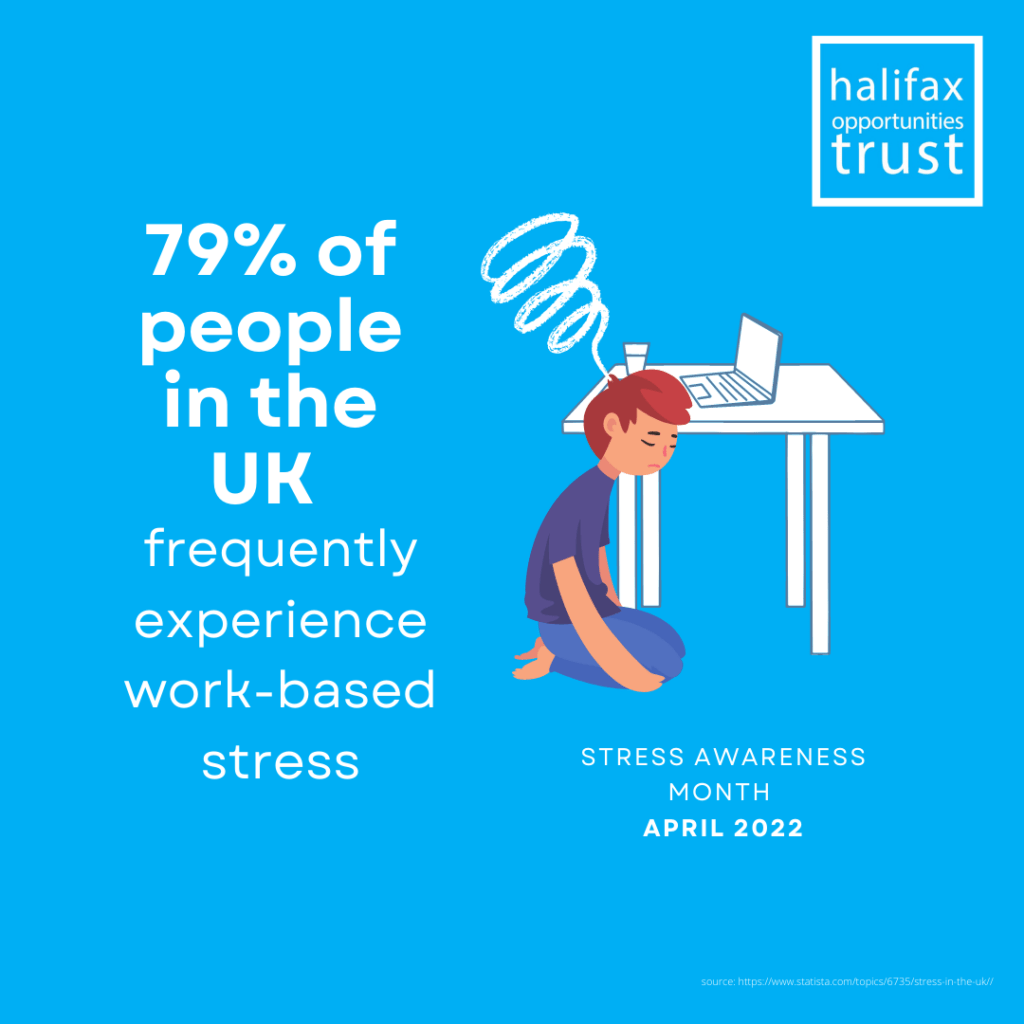Stress Awareness Month 2022 – Take Ten to Talk
April is Stress Awareness Month. This year’s theme is community and, while we consider the impact COVID-19 has had on the sense of community and the lack of ‘coming together’(read blog), there are also elements of the pandemic that have attributed to higher work-based stress.
65% of people in the UK have felt more stressed than ever before since the COVID-19 restrictions began in March 2020 (1). Additionally, a recent study (The Global Burnout Study 2022) has found that employee burnout has increased by over 5 % in the last 12 months.
We have identified that stress-levels are on the up, which is a real concern. To help our teams better understand and recognise the signs of stress, and how to manage and prevent this, we’ve provided them with weekly tips and advice throughout the month of April. The goal is to start an open conversation about workplace related stress, we covered the following topics:
Identifying Stress
Did you know that 79% of UK people regularly experienced work-related stress in 2020 (2)? This was the most common cause of stress experienced, followed by money or financial worries at 60% and family stress at 48%. Of course, sometimes it is not possible to avoid stressful situations. By identifying the stress signals that are unique to you, you are better equipped to deal with these feelings and avoid them escalating into something that could have an impact on your physical or mental health.
Unmanaged, stress can lead to the following conditions:
- Headaches and migraines.
- Depression and anxiety.
- Heart problems.
- Upset stomach.
- Obesity.
- Problems with fertility
Before it reaches this level, it’s important to look for the subtler changes physically, emotionally or behaviourally, or a combination of all three. Changes can include:
- Extroverts becoming withdrawn (vice versa)
- Becoming more accident prone
- Becoming short-tempered
- A dramatic change in weight
We have encouraged our teams to become more in-tune with their own stress signals, as well as those of the people they work with. Once we are able to better identify when we are stressed, we are better equipped to put measures in place to control it.
Measures to Control Stress
The Global Burnout Study from 2022, has found that employee burnout has increased by over 5 % in the last 12 months (3). To avoid stress becoming ‘burnout’, it’s important that we’re able to manage stress in a way that is beneficial to us. There may be times when stress is predictable, such as meetings with managers and dealing with difficult clients or colleagues. In some cases, it is unavoidable but being able to take control of our reactions can help better manage these situations and ensure stress levels remain low.
Some general tips on managing stress include:
- Get physically active
- Make time for the things you enjoy
- Mange your time effectively
- Practice breathing exercises
- Connect with people
- Take regular breaks away from your desk
- Exercise (breathing & physical)
- Prioritise
Having clarity over the signs of stress and measures to take when you feel stressed, can give a long-term outlook on how to manage your overall wellbeing. We have encouraged our teams to try and implement small changes to the way they handle stress, using the four A’s (Avoid, Alter, Adapt, Accept) method, which helps us to actively think about how we handle situations through a considered approach.
Preventative Measures for Stress
While some stressful situations cannot be avoided, it is possible to avoid feeling stressed; many times, this is down to how you are able to pre-empt and handle the situation. Furthermore, studies have shown that by living a healthier lifestyle you can become less inclined to feel stressed.
A recent study found that being under heavy stress shortens life expectancy by approximately 2.8 years (4). So, it makes sense to introduce positive lifestyle changes that can improve your life-expectancy beyond this. There are a number of useful measures to prevent stress altogether, through lifestyle improvements, including:
- Being pro-active
- Getting restful sleep
- Leading a healthier lifestyle
- Connecting with people
We believe that connecting with people is an important part of stress management, which is why want to focus on the benefits of talking about stress in the workplace going forward.
Talking About Stress
We want to help break down any barriers that may be preventing our employees from reaching out to managers or peers, for support. And, since this year’s theme is ‘community’, it’s more pertinent than ever to address the importance of having a trusted support network around us whether at work or at home, where we can feel safe to discuss our health.
It is important to talk about stress, as it can:
- Identify a need for support
- Help share concerns
- Make people aware of how you feel
- Give reflection and perspective
We want to create an open, safe and non-judgmental work environment here at HOT. Over the past month we have been encouraging our teams to ‘Take Ten To Talk’ about anything stress-related, to create an open-dialogue about stress.
It’s important that when people feel stressed they have the networks around them to feel validated and supported. Beyond Stress Awareness month we will be checking in with our employees with tips, advice and evidence-based information about stress, so we’re all better informed and better equipped to deal with it, as individuals and Trust-wide.
For more information about Stress Awareness Month, click here.
Source:
- https://www.stress.org.uk/free-resources/
- https://www.statista.com/topics/6735/stress-in-the-uk/
- https://www.stress.org.uk/wp-content/uploads/2022/03/Stress-Data-Workplace.pdf
- https://www.sciencedaily.com/releases/2020/03/200311100857.htm#:~:text=Being%20under%20heavy%20stress%20shortens,expectancy%20of%20men%20and%20women

